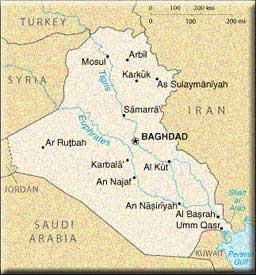Would an Invasion of Iraq Be a "Just War"?
 With the looming possibility of an armed conflict between Iraq and the United States and its allies, the U.S. Institute of Peace hosted a special symposium to examine various aspects of the question: "Would an invasion of Iraq be a 'just war'?" Part of an ongoing series of public workshops and symposiums organized by the Institute's Religion and Peacemaking Initiative, the session featured a distinguished panel of experts on religion, ethics, and international conflict.
With the looming possibility of an armed conflict between Iraq and the United States and its allies, the U.S. Institute of Peace hosted a special symposium to examine various aspects of the question: "Would an invasion of Iraq be a 'just war'?" Part of an ongoing series of public workshops and symposiums organized by the Institute's Religion and Peacemaking Initiative, the session featured a distinguished panel of experts on religion, ethics, and international conflict.
Moderated by David Smock, director of the Institute's Religion and Peacemaking Initiative, the discussion was webcast live and followed by questions from the floor and the Internet audience.
Speakers
- George Hunsinger
Professor, Princeton Theological Seminary. - Gerard Powers
Director of the Office of International Justice and Peace, U.S. Conference of Catholic Bishops. - Robert Royal
President, Faith and Reason Institute. - Susan Thistlethwaite
President, Chicago Theological Seminary
NOTE: Unable to Attend Due to Illness. - David Smock, Moderator
Director, Religion and Peacemaking Initiative, U.S. Institute of Peace.
Archived Audio
To listen to audio or to view video, please click on the links provided below. You also can right click on the links and choose "Save Target As" or "Download Linked File." This will save the file to your computer and then allow you to play it in your media player directly. More Audio Help.
All audio & video available in QuickTime format only.



